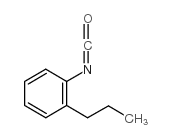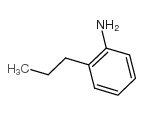190774-57-3
| 中文名 | 2-丙基苯异氰酸酯 |
|---|---|
| 英文名 | 1-isocyanato-2-propylbenzene |
| 中文别名 |
2-N-丙基苯基异氰酸酯
2-正丙基苯异氰酸酯 |
| 英文别名 |
2-propylbenzenisocyanate
MFCD00673045 2-n-propylphenyl isocyanate 2-Propylphenyl isocyanate |
| 密度 | 1.01 |
|---|---|
| 沸点 | 50ºC (0.1 mmHg) |
| 分子式 | C10H11NO |
| 分子量 | 161.20000 |
| 闪点 | 85ºC |
| 精确质量 | 161.08400 |
| PSA | 29.43000 |
| LogP | 2.60640 |
| 外观性状 | 透明无色至淡黄色液体 |
| 蒸汽压 | 0.0644mmHg at 25°C |
| 折射率 | 1.521-1.523 |
| 储存条件 | 密闭于0-6 ºC阴凉干燥环境中 |
| 稳定性 | 遵照规定使用和储存则不会分解。 |
| 分子结构 | 1、 摩尔折射率:49.80 2、 摩尔体积(m3/mol):166.0 3、 等张比容(90.2K):403.5 4、 表面张力(dyne/cm):34.8 5、 极化率(10-24cm3):19.74 |
| 计算化学 | 1.疏水参数计算参考值(XlogP):4.1 2.氢键供体数量:0 3.氢键受体数量:2 4.可旋转化学键数量:3 5.互变异构体数量:无 6.拓扑分子极性表面积29.4 7.重原子数量:12 8.表面电荷:0 9.复杂度:173 10.同位素原子数量:0 11.确定原子立构中心数量:0 12.不确定原子立构中心数量:0 13.确定化学键立构中心数量:0 14.不确定化学键立构中心数量:0 15.共价键单元数量:1 |
| 更多 | 1. 性状:无色至淡黄色液体 2. 密度(g/mL,25/4℃):1.01 3. 相对蒸汽密度(g/mL,空气=1):无可用 4. 熔点(ºC):无可用 5. 沸点(ºC,常压):50/0.1mmHg 6. 沸点(ºC,5.2kPa):无可用 7. 折射率:1.522 8. 闪点(ºC):无可用 9. 比旋光度(º):无可用 10. 自燃点或引燃温度(ºC):无可用 11. 蒸气压(kPa,25ºC):无可用 12. 饱和蒸气压(kPa,60ºC):无可用 13. 燃烧热(KJ/mol):无可用 14. 临界温度(ºC):无可用 15. 临界压力(KPa):无可用 16. 油水(辛醇/水)分配系数的对数值:无可用 17. 爆炸上限(%,V/V):无可用 18. 爆炸下限(%,V/V):无可用 19. 溶解性:无可用 |
Synonym:None Section 2 - COMPOSITION, INFORMATION ON INGREDIENTS
Risk Phrases: 20/21/22 36/37/38 Section 3 - HAZARDS IDENTIFICATION EMERGENCY OVERVIEW
Harmful by inhalation, in contact with skin and if swallowed. Irritating to eyes, respiratory system and skin.Moisture sensitive.Lachrymator (substance which increases the flow of tears). Potential Health Effects Eye: Causes eye irritation. Lachrymator (substance which increases the flow of tears). May cause chemical conjunctivitis. Skin: Causes skin irritation. Organic isocyanates can cause local irritation and allergic reactions. Ingestion: May cause gastrointestinal irritation with nausea, vomiting and diarrhea. The toxicological properties of this substance have not been fully investigated. Inhalation: Causes respiratory tract irritation. The toxicological properties of this substance have not been fully investigated. At high concentrations, isocyanates affect mucous membranes of the respiratory tract and may lead to fatal pulmonary edema. Exposure to low and often even unmeasurable isocyanate concentration results in sensitization. Can produce delayed pulmonary edema. Chronic: Effects may be delayed. Chronic overexposure to isocyanates has been reported to cause lung damage, including decreased lung fuction, which may be permanent. Section 4 - FIRST AID MEASURES Eyes: Flush eyes with plenty of water for at least 15 minutes, occasionally lifting the upper and lower eyelids. Get medical aid. Do NOT allow victim to rub eyes or keep eyes closed. Skin: Get medical aid. Flush skin with plenty of water for at least 15 minutes while removing contaminated clothing and shoes. Wash clothing before reuse. Destroy contaminated shoes. Ingestion: Get medical aid. Do NOT induce vomiting. If conscious and alert, rinse mouth and drink 2-4 cupfuls of milk or water. Inhalation: Remove from exposure and move to fresh air immediately. If not breathing, give artificial respiration. If breathing is difficult, give oxygen. Get medical aid. Do NOT use mouth-to-mouth resuscitation. If breathing has ceased apply artificial respiration using oxygen and a suitable mechanical device such as a bag and a mask. Notes to Physician: Treat symptomatically and supportively. Section 5 - FIRE FIGHTING MEASURES General Information: As in any fire, wear a self-contained breathing apparatus in pressure-demand, MSHA/NIOSH (approved or equivalent), and full protective gear. During a fire, irritating and highly toxic gases may be generated by thermal decomposition or combustion. Extinguishing Media: Use agent most appropriate to extinguish fire. Do NOT get water inside containers. Use water spray, dry chemical, carbon dioxide, or appropriate foam. Section 6 - ACCIDENTAL RELEASE MEASURES General Information: Use proper personal protective equipment as indicated in Section 8. Spills/Leaks: Clean up spills immediately, observing precautions in the Protective Equipment section. Sweep up or absorb material, then place into a suitable clean, dry, closed container for disposal. Provide ventilation. Do not get water inside containers. Section 7 - HANDLING and STORAGE Handling: Wash thoroughly after handling. Avoid contact with eyes, skin, and clothing. Keep container tightly closed. Avoid ingestion and inhalation. Use with adequate ventilation. Do not allow contact with water. Wash clothing before reuse. Keep from contact with moist air and steam. Storage: Store in a tightly closed container. Store in a cool, dry, well-ventilated area away from incompatible substances. Store protected from moisture. Section 8 - EXPOSURE CONTROLS, PERSONAL PROTECTION Engineering Controls: Facilities storing or utilizing this material should be equipped with an eyewash facility and a safety shower. Use adequate ventilation to keep airborne concentrations low. Exposure Limits CAS# 190774-57-3: Personal Protective Equipment Eyes: Wear appropriate protective eyeglasses or chemical safety goggles as described by OSHA's eye and face protection regulations in 29 CFR 1910.133 or European Standard EN166. Skin: Wear appropriate protective gloves to prevent skin exposure. Clothing: Wear appropriate protective clothing to prevent skin exposure. Respirators: A respiratory protection program that meets OSHA's 29 CFR 1910.134 and ANSI Z88.2 requirements or European Standard EN 149 must be followed whenever workplace conditions warrant respirator use. Section 9 - PHYSICAL AND CHEMICAL PROPERTIES Physical State: Clear liquid Color: colorless to light yellow Odor: Not available. pH: Not available. Vapor Pressure: Not available. Viscosity: Not available. Boiling Point: 50 deg C @ .05 mmHg Freezing/Melting Point: Not available. Autoignition Temperature: Not available. Flash Point: 185 deg F ( 85.00 deg C) Explosion Limits, lower: Not available. Explosion Limits, upper: Not available. Decomposition Temperature: Solubility in water: Specific Gravity/Density: Molecular Formula: C10H11NO Molecular Weight: 161.20 Section 10 - STABILITY AND REACTIVITY Chemical Stability: Stable at room temperature in closed containers under normal storage and handling conditions. Conditions to Avoid: Incompatible materials, moisture, excess heat. Incompatibilities with Other Materials: Strong oxidizing agents, strong acids, strong bases, moisture. Hazardous Decomposition Products: Carbon monoxide, oxides of nitrogen, irritating and toxic fumes and gases, carbon dioxide. Hazardous Polymerization: Has not been reported Section 11 - TOXICOLOGICAL INFORMATION RTECS#: CAS# 190774-57-3 unlisted. LD50/LC50: Not available. Carcinogenicity: 2-N-propylphenyl Isocyanate - Not listed by ACGIH, IARC, or NTP. Section 12 - ECOLOGICAL INFORMATION Section 13 - DISPOSAL CONSIDERATIONS Dispose of in a manner consistent with federal, state, and local regulations. Section 14 - TRANSPORT INFORMATION IATA Shipping Name: ISOCYANATES, TOXIC, N.O.S.* Hazard Class: 6.1 UN Number: 2206 Packing Group: III IMO Shipping Name: ISOCYANATES, TOXIC, N.O.S. Hazard Class: 6.1 UN Number: 2206 Packing Group: III RID/ADR Shipping Name: ISOCYANATES, TOXIC, N.O.S. Hazard Class: 6.1 UN Number: 2206 Packing group: III Section 15 - REGULATORY INFORMATION European/International Regulations European Labeling in Accordance with EC Directives Hazard Symbols: XN Risk Phrases: R 20/21/22 Harmful by inhalation, in contact with skin and if swallowed. R 36/37/38 Irritating to eyes, respiratory system and skin. Safety Phrases: S 26 In case of contact with eyes, rinse immediately with plenty of water and seek medical advice. S 28A After contact with skin, wash immediately with plenty of water. S 36/37/39 Wear suitable protective clothing, gloves and eye/face protection. S 37 Wear suitable gloves. S 45 In case of accident or if you feel unwell, seek medical advice immediately (show the label where possible). WGK (Water Danger/Protection) CAS# 190774-57-3: No information available. Canada None of the chemicals in this product are listed on the DSL/NDSL list. CAS# 190774-57-3 is not listed on Canada's Ingredient Disclosure List. US FEDERAL TSCA CAS# 190774-57-3 is not listed on the TSCA inventory. It is for research and development use only. SECTION 16 - ADDITIONAL INFORMATION N/A |
|
生态学数据: 该物质对环境可能有危害,对水体应给予特别注意。
|
| 危害码 (欧洲) | Xn:Harmful; |
|---|---|
| 风险声明 (欧洲) | R20/21/22;R36/37/38;R42 |
| 安全声明 (欧洲) | S23-S26-S36/37/39-S45 |
| 危险品运输编码 | UN 2206 |
| 海关编码 | 2929109000 |
|
~% 
190774-57-3 |
| 文献:Bioorganic and Medicinal Chemistry, , vol. 17, # 23 p. 8102 - 8112 |
| 海关编码 | 2929109000 |
|---|---|
| 中文概述 | 2929109000. 其他异氰酸酯. 增值税率:17.0%. 退税率:13.0%. 监管条件:无. 最惠国关税:6.5%. 普通关税:30.0% |
| 申报要素 | 品名, 成分含量, 用途 |
| Summary | 2929109000. other isocyanates. VAT:17.0%. Tax rebate rate:13.0%. . MFN tariff:6.5%. General tariff:30.0% |



